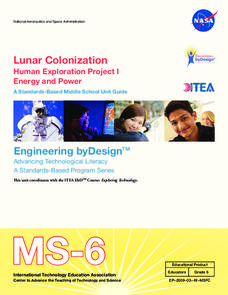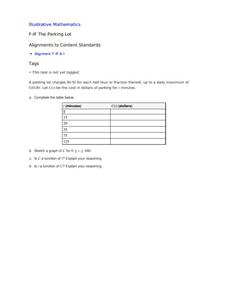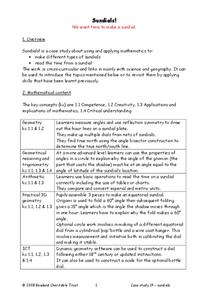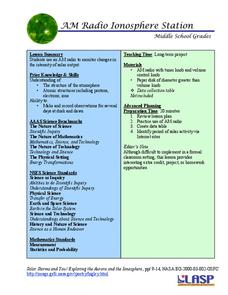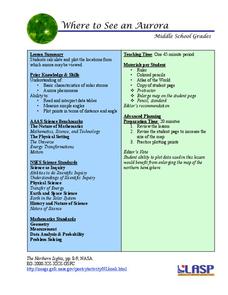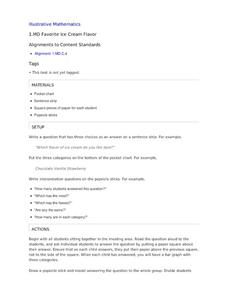Curated OER
Tiles, Blocks, Sapphires & Gold: Designing a Treasure Map
Young cartographers in groups hide treasure at school and then create a map to find it using pattern blocks and tiles. They make paintings with clues to create a visual representation of the location of their treasure. Groups present...
Curated OER
Recycling and Composting
Students set up composting sites that allow food scraps and paper to be recycled by nature. They are introduced to one aspect of recycling; composting. Students see how God recycles as the worms change garbage into something that brings...
Curated OER
Compare and Contrast Night to Life is Beautiful
After reading Elie Wiesel's Night, watching the movie Life is Beautiful, and researching World War II, class members write a comparison essay on the book and film. This includes a prior knowledge activity, discussion in whole and small...
NASA
Lunar Colonization
A five-lesson unit challenges teams to design a complex to allow people to colonize the Moon. The teams first work in order to understand the challenge before becoming experts. Expert teams learn about different aspects needed to survive...
Curated OER
Graphing Canada
Students research a province of Canada choosing a question to investigate. They record their information on a worksheet that is provided and complete a graph. They present their bar graphs to the class.
NTTI
Vectors: Traveling, But in What Direction
High schoolers watch a video of real-world situations regarding speed, direction, velocity, force, etc. and answer questions while viewing. They then practice drawing and using vectors to solve more real-world problems.
University of Colorado
Patterns and Fingerprints
Human fingerprint patterns are the result of layers of skin growing at different paces, thus causing the layers to pull on each other forming ridges. Here, groups of learners see how patterns and fingerprints assist scientists in a...
Illustrative Mathematics
The Parking Lot
Use the real-world cost of parking a car to demonstrate the properties of a function. The resource describes to learners how much it is to park in a certain lot. It is up to your number crunchers to complete a table of minutes and...
Curated OER
Cell Phones
Your texters will enjoy assessing their knowledge of function notation in this simple set of exercises. They will also interpret function notation in terms of the given context.
Bowland
Sundials!
Time to learn about sundials. Scholars see how to build sundials after learning about Earth's rotation and its relation to time. The unit describes several different types of possible sundials, so choose the one that fits your needs — or...
PHET
Radiation Hazards in Space
Young scientists race from Earth to Mars and back, trying to complete mission objectives while avoiding radiation in this game for 2-4 players. To identify the winner, players must graph their mission points and radiation points at the...
PHET
AM Radio Ionosphere Station
Tune in! Young scientists use an AM radio at home to monitor solar output. The long-term project would be ideal in a flipped classroom or as an out-of-class project.
PHET
Where to See an Aurora
Where can you see an aurora in North America? After completing an astronomy activity, scholars can locate the exact coordinates. Pupils plot points of the inner and outer ring of the auroral oval and answer questions based on their...
PHET
CME Plotting
Young scientists build on their previous knowledge and apply it to coronal mass ejections. By plotting the path of two different coronal mass ejections, they develop an understanding of why most don't collide with Earth.
Curated OER
Button Math
Use buttons, cards, and dice to perform simple math problems! This inventive instructional activity should be quite engaging for young learners. Kindergarteners use buttons to help them understand the concepts of greater than, less than,...
Curated OER
Super Science By Any Means Necessary!
The animated S2 Unit will use the adventures of a Super Hero and her sidekick to teach basic science and math concepts. Educators can use comic books, Saturday Morning Cartoons and the adventures of Super Heroes to teach a nine-week...
Teach Engineering
The Cloning of Cells
Did you know that there are over 200 different types of cells in the human body? One type, the stem cell, is the focus of the fifth of six installments in the Cells unit. The instructional activity asks the class to discuss stem cells...
Illustrative Mathematics
Favorite Ice Cream Flavor
What better way to engage children in a math lesson than by talking about ice cream? Using a pocket chart or piece of chart paper, the class works together creating a bar graph of the their favorite ice cream flavors. Learners then work...
Intel
Choreographing Math
Leaners investigate families of linear functions through dance. They choreograph dance moves to model nine unique linear functions of their choosing. Using their dance moves, teams create a video presentation complete with music and...
DiscoverE
Hidden Alarm
It's time to wake up! Young engineers build an electric circuit that will activate an alarm. The use of switches in the circuit is a must—because you don't want the alarm to keep beeping forever!
Kenan Fellows
Terrarium in a Bottle: Modeling the Atmosphere, Greenhouse Effect, and Water Cycle
You've heard of farm to table ... but what about farm in classroom? Junior agriculturalists embark upon a two-week journey into the science of growing things. Based upon the classic terrarium in a two-liter experiment, the lesson goes...
Curated OER
Y-Intercept and Slope Intercept Form
Alegebra amateurs identify the slope and the y-intercept given a linear equation in slope-intercept form by correctly completing some in class problems. They write the linear equation in slope-intercept form that corresponds to the given...
Curated OER
Reading Graphs
Working independently or in teams, your class practices connecting graphs, formulas and words. This lesson includes a guided discussion about distance vs. time graphs and looking at how velocity changes over time.
Curated OER
Discovering Pi
Define terminology related to a circle. Practice accuracy in measuring and then create a spreadsheet based on data collected from solving for parts of a circle. Groups can have fun analyzing their data as it relates to Pi.





